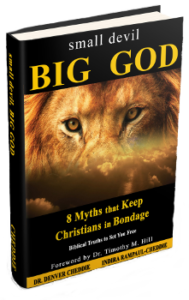If this thought has ever crept into your mind, you’re not alone. As one of the most-asked questions, the earth’s age has been debated for years, decades, centuries, and eons. Or perhaps even longer.
The earth is presumed to be approximately 4.5 billion years old. But how accurate is this presumption? Since the Bible doesn’t reveal the earth’s age, there has been a lot of speculation around its exact origin. And rightfully so. However, people often get caught up in unnecessary complexities and fail to look at the bigger picture.
In this blog, we’ll break down the basics. From diving deep into what young earth creationists believe to gauging the validity of the wild assumptions that are out there, we’ll help you weigh the pros and cons of common notions around the earth’s age. We’ll also offer some book recommendations along the way. Continue reading to get started!
The belief that the earth is 6000-10000 years old is either the most common view among Christian theologians … or the loudest view. The question how old is the earth raises a lot of unnecessary controversy, especially considering that the Bible does not spell out how old is the earth. I will demonstrate that young earth creationism is based more on theology than scripture.
A casual reading of Genesis 1 does suggest that God finished His creation in 6 days. Then when you add up all the genealogies in the Bible, accounting for skipped generations, you get the figure 6,000 – 10,000 years for the age of the earth.
For sure, the Bible teaches that man was created 6-10 thousand years ago. But the belief that the earth is also that same age (plus 6 days) hinges on the belief that the creation days mentioned in Genesis 1 were literal 24-hour days. I am disinclined to accept this view.
Anyone who believes that they are not literal 24-hour days are considered heathens and they need to get saved. At least that’s what young earth creationists would have us believe. One such person told me that I needed to get saved simply because I entertained the idea that the gap theory is worth looking into.
Theology vs Scripture
Ken Ham is a well-known young earth creationist. I applaud him for his excellent work in creation science and apologetics. I recently read a book by him on How to Raise Godly Children in an Ungodly World. This was the gist of that book:
To raise godly children you need to do 2 things:
1) teach your kids young earth creationism otherwise how could they believe anything the Bible teaches?
2) homeschool them otherwise they will (not might) but absolutely will beyond a shadow of a doubt lose their faith.
OK then Ken Ham.
I should point out that Biblical faith is never presented as being that fragile. Biblical faith is likened to a house built on a rock, like a seed that falls on good soil and grows roots. Biblical faith is solid strong – as long as it is based on God’s word.
The problem with Ken Ham is that he is fighting for a faith in young earth theology more so than faith based on God’s Word. That’s why it is so fragile.
Theology is great. But it is never equal to or above scripture. Scripture is our foremost authority. Theology is at best man’s attempt to understand God through the scripture. Theology is subject to man-made interpretations of God’s Word, which is why theology is fallible. God’s Word is infallible.
The belief in a young earth is more so a theological statement than a Biblical fact. The Bible simply does not spell out how old is the earth.
DOWNLOAD FREE CHAPTERS FROM OUR NEW BOOKS
Were the creation days literally 24 hours long?
The evening and the morning were one day
Jewish terminology
The strongest argument in favor of short literal creation days is the expression “evening and morning” appearing 6 times in Genesis 1. This gives the impression that the writer is talking about literal days. Why the reference to evening and morning if it were not literal days? Right?
But why “evening and morning” as opposed to “morning and evening” or “day and night”. Why say evening first, before morning? Hmmm. Naturally, since God created light, and darkness is simply the absence of light, you would expect the writer to say “morning and evening”. In fact, in Genesis 1:5, God said Day before night.
God called the light Day, and the darkness He called Night. … Genesis 1:5
The only reason the Bible writers said “evening and morning” is because the Jews reckoned the day as starting and ending at sunset (6pm). That’s the only reason. This expression is comprehensive proof that Genesis was written from a primarily Jewish, human, pre-science point of view.
It is a figurative expression that simply communicates to a Jewish reader that this was one day. But this does not mean that the days were 24 hours long.
The rotation of the earth was only set in order on Day 4
The concept of a 24 hour day is based on the scientific fact that the earth takes 24 hours to rotate on its axis. Venus on the other hand takes about 243 days to complete a single rotation. In other words, a day on Venus is 243 times as long as a day on earth. The length of a day depends on which planet you’re on.
Then God said, “Let there be lights in the firmament of the heavens to divide the day from the night; and let them be for signs and seasons, and for days and years” … Genesis 1:4
This verse depict the events of Day 4 of creation. See my other article on the creation days. Before this, the concept of day and night ON EARTH did not exist. There was no evening and morning on the first day – it was just a figure of speech. The concept of seasons and years did not exist. The movement of the earth around the sun was not established prior to this point.
So how could you say that the first 3 days of creation were literally 24-hour days?
A LOT happened on Day 4-6 – I mean A LOT
In the latter half of Day 4, God caused vegetation to grow. On Day 5 and the first half of Day 6, He created animals. By the time He created man on Day 6, the earth was already populated with animals and vegetation.
And the earth brought forth grass, the herb that yields seed according to its kind, and the tree that yields fruit, whose seed is in itself according to its kind. … Genesis 1:12
You could argue that God probably created a planet full of animals. Fair enough, but you cannot say the same thing about the vegetation. God did create the herbs and the grass, but God did not create the grass out of nothing, rather He caused the grass to grow naturally (see Genesis 2:5-6). Sure this could have happened in 2 and ½ days. Or maybe, the days were longer than 24 hours.
Why did God need a mist to water the earth?
… before any plant of the field was in the earth and before any herb of the field had grown. For the Lord God had not caused it to rain on the earth, and there was no man to till the ground; but a mist went up from the earth and watered the whole face of the ground. … Genesis 2:5-6
These verses go into more detail on Day 4 of creation. See my other article on the creation order.
On Day 4, God caused the waters (oceans) to separate and the dry land appeared. Then later that day, God caused vegetation to grow. Genesis 2:5-6 explain how God created vegetation. He chose not to do it miraculously, but via natural processes.
There was no rain. There was no man to till the earth. So God caused a mist to water the ground.
BUT WAIT!!!
Early in Day 4, God had only just a few hours ago separated the oceans from off the land. Wouldn’t you expect the land to still be at least a little damp? The fact that God needed a mist to water the earth suggests that it had already dried. It sounds like more than just a few hours had elapsed, suggesting that the day was much longer than 24 hours during this time.
I am more inclined to believe that the rotation of the earth was only set in motion on Day 4, but did not reach the full speed of rotation until Day 6. In other words, the creation days were more than 24 hours long – the first 4 being much longer than the last 3.
So why would God need millions and billions of years to create the earth?
I could just as easily ask why God needed 6 days. God could have done it in one second. God chose to do it how He did it.
God stands outside of time and as such does not experience time the same way we do. So whether God took seconds, days or billions of years to create the earth, it does not make a difference. For Him, it was like an instant.
Conclusion
I am reluctant to accept that view that the creation took place in literally 144 hours. Now if the Bible clearly stated that, then I would believe it. But Genesis 1 does not warrant this conclusion. I believe that the early creation days was very long. By Day 4, the movement of the earth relative to the sun was set in order, but not at full speed as yet. But by the end of creation, the speed of rotation increased to produce 24 hour days.
So how old is the earth? The Bible does not give a number. But I am pretty sure it is much more than 10 thousand years. Could it be 4.7 billion years? It’s possible.


